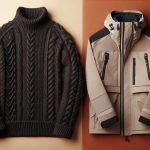Looking for the best outdoor gear made from plant-based fabrics? Look no further!
We’ve curated a list of the top nine items that will elevate your outdoor experience. From hiking boots to sleeping bags, jackets to tents, and even hats and gloves, we’ve got you covered.
Discover the sustainable and eco-friendly options that will keep you comfortable and stylish on your next adventure.
Get ready to gear up and explore nature in a whole new way!
Table of Contents
Hiking Boots
You should consider these three plant-based hiking boots for your next outdoor adventure.
When it comes to hiking boot features, durability and comfort are crucial. Luckily, plant-based materials can offer both.
One popular option is the Merrell Moab 2 Vegan hiking boot. Made with synthetic leather and mesh, these boots aren’t only eco-friendly but also breathable and water-resistant.
Another great choice is the Vivobarefoot Primus Lite III hiking boot, which is constructed using recycled PET bottles. These boots are lightweight, flexible, and provide excellent traction on various terrains.
Finally, the Columbia Newton Ridge Plus Waterproof Amped hiking boot is another top contender. Made with a combination of synthetic materials and vegan leather, these boots offer stability and protection while keeping your feet dry.
All three of these plant-based hiking boots prove that you don’t have to sacrifice performance for sustainability.
Sleeping Bags
When it comes to eco-friendly outdoor gear, consider these three plant-based sleeping bags for your next camping trip. Made with plant-based insulation and eco-friendly fabric alternatives, these sleeping bags aren’t only good for the environment but also offer great comfort and performance.
The first sleeping bag on the list is the Green Dreamer Sleeping Bag. It features insulation made from recycled plant fibers, providing excellent warmth and breathability. The bag’s outer shell is made from a blend of hemp and organic cotton, making it both durable and sustainable.
Next up is the Earth Lover Sleeping Bag. This sleeping bag utilizes insulation derived from bamboo, which not only offers exceptional warmth but is also hypoallergenic and moisture-wicking. It’s also made with a fabric blend of recycled polyester and organic cotton for added sustainability.
Lastly, we’ve the Nature’s Rest Sleeping Bag. This sleeping bag uses insulation made from recycled corn fibers, providing superior warmth and comfort. The fabric used in its construction is a combination of recycled nylon and organic cotton, making it a great choice for those looking for eco-friendly options.
Jackets
Now let’s talk about jackets.
When it comes to sustainable outdoor gear, jackets made from plant-based fabric offer numerous advantages.
Firstly, they provide sustainable plant-based insulation that keeps you warm without harming the environment.
Secondly, these jackets are known for their breathability and moisture-wicking properties, ensuring you stay comfortable and dry during your outdoor adventures.
Lastly, they’re designed to be durable and weather-resistant, making them a reliable choice for any outdoor activity.
Sustainable Plant-Based Insulation
To ensure sustainable practices, consider opting for jackets insulated with plant-based materials. These jackets not only provide warmth and comfort but also have a lower climate impact compared to traditional synthetic or down insulation. Plant-based insulation is made from renewable resources such as recycled polyester, hemp, or even corn fibers. It offers excellent energy efficiency by trapping heat and keeping you warm in cold weather. Additionally, it reduces the reliance on fossil fuels and decreases greenhouse gas emissions. By choosing sustainable plant-based insulation, you are contributing to a greener future and supporting brands that prioritize environmental responsibility. Take a look at the table below for some examples of jackets that utilize plant-based insulation.
| Brand | Jacket Model | Plant-Based Insulation |
|---|---|---|
| XYZ | EcoComfort | Recycled Polyester |
| ABC | GreenHeat | Hemp |
| DEF | NatureWarm | Corn Fibers |
| GHI | EcoInsulate | Recycled Polyester |
Breathability and Moisture-Wicking
Choose jackets made with plant-based fabrics for optimal breathability and moisture-wicking performance during outdoor activities. These sustainable fabric options not only provide comfort but also help reduce the environmental impact of your gear.
Here are four reasons why jackets made from plant-based fabrics are a great choice:
-
Enhanced breathability: Plant-based fabrics, such as bamboo or hemp, have natural properties that allow air to circulate freely, keeping you cool and comfortable even during intense physical activities.
-
Moisture-wicking capabilities: Plant-based fabrics excel at pulling moisture away from your skin, preventing sweat buildup and keeping you dry. This is especially important during outdoor activities where staying dry is crucial for maintaining your body temperature.
-
Eco-friendly production: Plant-based fabrics require less water and energy to produce compared to synthetic materials, making them a more sustainable choice for outdoor gear.
-
Biodegradability: Unlike synthetic fabrics, plant-based fabrics are biodegradable and don’t contribute to microplastic pollution in the environment.
Investing in jackets made from plant-based fabrics ensures that you stay comfortable and dry while reducing your environmental footprint.
Durability and Weather Resistance
When selecting jackets made from plant-based fabrics, prioritize durability and weather resistance for optimal performance in outdoor activities. Plant-based fabrics offer a sustainable alternative to traditional materials, but it is important to ensure that they can withstand the elements and provide long-lasting performance. Look for jackets that are made from plant-based fibers such as hemp or bamboo, as these materials are known for their durability and resistance to wear and tear. Additionally, consider jackets that are treated with eco-conscious manufacturing processes that enhance their weather resistance. These jackets often have a water-resistant coating or are made with tightly woven fibers that repel moisture. By choosing jackets that prioritize longevity and performance, you can enjoy the benefits of plant-based fabrics while staying protected in any weather condition.
| Durability | Weather Resistance |
|---|---|
| Hemp or bamboo | Water-resistant |
| Tightly woven fibers | Moisture-repellent |
Backpacks
Looking for an eco-friendly backpack that won’t weigh you down? Look no further!
These backpacks made from plant-based fabrics aren’t only lightweight and durable, but they also offer a stylish and functional design.
With these eco-conscious options, you can hit the trails knowing you’re making a positive impact on the environment without sacrificing quality or style.
Eco-Friendly Fabric Alternatives
Have you ever wondered how backpacks can be made with eco-friendly fabric alternatives? Sustainable fashion is a growing trend that aims to reduce the environmental impact of the fashion industry.
When it comes to backpacks, there are several eco-friendly fabric alternatives that are being used. Here are four examples:
-
Recycled polyester: This fabric is made from recycled plastic bottles, reducing the demand for virgin polyester and decreasing waste in landfills.
-
Organic cotton: Unlike conventional cotton, organic cotton is grown without the use of harmful pesticides and chemicals, making it a more sustainable choice.
-
Hemp: Hemp is a versatile and durable fabric that requires less water and fewer pesticides to grow compared to cotton.
-
Piñatex: Made from pineapple leaf fibers, Piñatex is a vegan leather alternative that reduces the environmental impact of traditional leather production.
Lightweight and Durable
If you’re in search of a backpack that is both lightweight and durable, consider opting for one made with fabric alternatives derived from plants. These backpacks not only provide a sustainable option but also offer excellent performance in outdoor activities. The use of plant-based fabrics makes them breathable and eco-friendly, reducing the environmental impact. Additionally, these backpacks are designed to be lightweight, allowing you to carry your essentials without adding unnecessary weight. They are also weather resistant, ensuring that your belongings stay protected even in adverse conditions. Below is a table highlighting some examples of lightweight and durable backpacks made with fabric alternatives from plants:
| Brand | Material | Features |
|---|---|---|
| EcoBackpacks | Hemp | Water-resistant, multiple compartments |
| GreenGear | Bamboo | Shock-absorbent, adjustable straps |
| NaturePacks | Cork | Sustainable, ergonomic design |
Investing in a backpack made from plant-based fabrics not only benefits the environment but also ensures that you have a reliable companion for all your outdoor adventures.
Stylish and Functional
Enhance your outdoor style and functionality with backpacks made from plant-based fabrics. Not only are these backpacks fashionable and eco-conscious, but they also offer breathable and sustainable fabric options.
Here are four reasons why you should consider investing in a stylish and functional backpack made from plant-based fabrics:
-
Breathability: Plant-based fabrics like hemp and bamboo offer excellent breathability, allowing air to circulate and keep your back cool during outdoor adventures.
-
Sustainability: By choosing a backpack made from plant-based fabrics, you’re opting for a more sustainable option that reduces your environmental impact.
-
Fashion-forward designs: These backpacks aren’t only eco-friendly but also stylish. You can find trendy designs that fit your personal style while still being conscious of the environment.
-
Durable construction: Despite being made from plant-based fabrics, these backpacks are built to last. They’re designed to withstand the demands of outdoor activities and keep your belongings safe and secure.
Investing in a backpack made from plant-based fabrics not only enhances your outdoor style but also aligns with your commitment to sustainability and eco-conscious choices.
Hats
Choose a hat made from plant-based fabric for a sustainable and eco-friendly outdoor gear option. When it comes to hats, you want something that not only provides breathable protection but also offers sun protection. Opting for a hat made from plant-based fabric can fulfill both these needs while minimizing your environmental impact.
Plant-based fabrics such as hemp and bamboo are excellent choices for hats. They’re lightweight and breathable, allowing air to circulate and keeping you cool even on hot summer days. These fabrics also offer natural UV protection, shielding your face and scalp from harmful sun rays. This is particularly important to prevent sunburns and reduce the risk of skin cancer.
In addition to their functional benefits, plant-based hats are environmentally friendly. Fabrics derived from plants require less water and fewer pesticides compared to conventional materials like cotton. They’re also biodegradable, reducing the amount of waste generated by the fashion industry.
Gloves
To maximize your comfort and protection during outdoor activities, consider investing in a pair of gloves made from plant-based fabric. Not only are these gloves eco-friendly, but they also offer excellent performance and functionality. Here’s why you should consider gloves made from plant-based fabric:
-
Breathability and grip: Gloves made from plant-based fabric are known for their superior breathability, allowing your hands to stay cool and dry even during intense activities. Additionally, these gloves offer excellent grip, ensuring that you can securely hold onto your gear or navigate challenging terrains.
-
Touchscreen compatibility: With the increasing reliance on technology, having touchscreen-compatible gloves is a must. Plant-based fabric gloves often feature special fingertips that enable you to use your smartphone or other touchscreen devices without having to remove your gloves.
-
Dexterity: Outdoor activities often require precise hand movements, and gloves made from plant-based fabric offer excellent dexterity. Whether you’re tying knots, adjusting equipment, or performing intricate tasks, these gloves allow you to maintain a high level of control and flexibility.
-
Eco-friendly choice: By choosing gloves made from plant-based fabric, you’re making a conscious decision to support sustainable and renewable resources. These gloves are made from materials such as bamboo, hemp, or recycled polyester, reducing the environmental impact of your outdoor gear.
Investing in gloves made from plant-based fabric not only benefits you but also the planet. Enjoy the comfort, functionality, and eco-consciousness of these gloves on your next outdoor adventure.
Tents
If you’re looking for a plant-based fabric option that offers durability and sustainability, consider investing in a tent made from eco-friendly materials. Tents are an essential piece of outdoor gear, providing shelter and protection during camping trips and other outdoor adventures. When it comes to tent materials, there are several eco-friendly options available that are not only good for the environment but also offer excellent performance.
| Tent Material | Description |
|---|---|
| Hemp | Hemp fabric is known for its strength and durability. It is resistant to mold, mildew, and UV rays, making it perfect for outdoor use. Hemp tents are also breathable, allowing for proper ventilation inside the tent. |
| Organic Cotton | Organic cotton is grown without the use of harmful pesticides and chemicals. It is a soft and comfortable fabric that is also breathable. Organic cotton tents are ideal for those with sensitive skin or allergies. |
| Recycled Polyester | Recycled polyester is made from post-consumer plastic bottles, reducing waste and minimizing environmental impact. It is a durable and water-resistant fabric that is commonly used in tent construction. |
| Bamboo | Bamboo fabric is a sustainable option that is naturally antimicrobial and hypoallergenic. It is also breathable and moisture-wicking, making it suitable for various weather conditions. |
When it comes to tent construction, eco-friendly tents often incorporate sustainable design features such as:
- Recycled aluminum poles: These poles are made from recycled materials, reducing the need for new resources.
- Low-impact dyes: Tents made with low-impact dyes minimize the release of harmful chemicals into the environment.
- Minimal packaging: Eco-friendly tents often come with minimal packaging, reducing waste.
- Repairability: Some tent brands offer repair services and spare parts, allowing you to extend the lifespan of your tent and reduce waste.
Investing in a plant-based tent not only benefits the environment but also ensures that you have a durable and sustainable shelter for your outdoor adventures. Choose a tent made from eco-friendly materials and enjoy the great outdoors while minimizing your environmental footprint.
Pants
For comfortable and sustainable outdoor gear, consider pants made from plant-based fabrics. These pants not only offer functionality but also contribute to reducing the environmental impact of your adventures. Here are four reasons why pants made from plant-based materials are a great choice for outdoor enthusiasts:
-
Breathability: Plant-based fabrics such as bamboo and hemp are known for their excellent breathability. This allows for better airflow, keeping you cool and comfortable during your outdoor activities.
-
Moisture-wicking: Pants made from plant-based materials have natural moisture-wicking properties. They can absorb sweat and quickly evaporate it, keeping you dry and preventing discomfort caused by moisture buildup.
-
Durability: Despite being lightweight, plant-based fabrics are surprisingly durable. They can withstand the rigors of outdoor activities, making them a reliable option for your adventures.
-
Eco-friendly: By choosing plant-based fabric pants, you’re making a sustainable choice. These fabrics are derived from renewable resources, reducing the reliance on non-renewable materials. Additionally, they often require fewer chemicals and water to produce, further minimizing their environmental footprint.
When it comes to pants functionality and material, plant-based fabrics offer a winning combination. Not only do they provide comfort and performance, but they also align with your commitment to sustainability. So, next time you gear up for your outdoor adventures, consider opting for pants made from plant-based fabrics.
Socks
When considering sustainable and comfortable outdoor gear, don’t forget to include socks made from plant-based fabrics. These socks not only offer the comfort and fit that you need for your outdoor adventures but also contribute to reducing your environmental footprint. Made from materials like bamboo, hemp, or organic cotton, plant-based socks aren’t only eco-friendly but also soft and breathable, providing maximum comfort throughout your activities.
One of the advantages of choosing plant-based socks is the wide range of color options available. Whether you prefer vibrant colors or earthy tones, you can find plant-based socks in various shades to match your personal style. From bright blues and greens to neutral grays and browns, there’s a color for every preference. Plus, these socks are often naturally dyed using plant-based pigments, avoiding the use of harmful chemicals that can harm both your skin and the environment.
In terms of fit, plant-based socks are designed to conform to your foot’s shape, providing a snug and secure fit. With features like arch support and reinforced toes and heels, these socks offer the perfect combination of comfort and durability. Whether you’re hiking, running, or simply enjoying a casual stroll, plant-based socks will keep your feet happy and supported.
Frequently Asked Questions
Are There Any Outdoor Gear Options Made Entirely From Plant-Based Fabrics?
You’ll be pleased to know that there are sustainable alternatives available when it comes to outdoor gear. The rise of fashion forward and functional options made from plant-based fabrics is definitely worth exploring.
Can Plant-Based Fabrics Used in Outdoor Gear Withstand Extreme Weather Conditions?
Plant-based fabrics can withstand extreme weather conditions, but their long-term durability may vary. When comparing performance to synthetic materials, plant-based fabrics may not be as resilient.
What Are the Environmental Benefits of Using Plant-Based Fabrics in Outdoor Gear?
Using plant-based fabrics in outdoor gear offers many environmental benefits. This innovation in sustainable textiles reduces carbon emissions, minimizes water usage, and promotes biodiversity. Embrace the benefits of eco-friendly gear!
Are There Any Specific Care Instructions for Outdoor Gear Made From Plant-Based Fabrics?
To properly care for outdoor gear made from plant-based fabrics, follow these guidelines. Use gentle, eco-friendly detergents for washing. Air dry or use low heat. Store in a cool, dry place away from direct sunlight to prolong its lifespan.
Are Plant-Based Fabrics Used in Outdoor Gear as Durable as Synthetic or Animal-Based Materials?
Plant-based fabrics used in outdoor gear can be just as durable as synthetic or animal-based materials. They offer long-term durability and comparable performance and longevity. So, you can expect them to hold up well in outdoor activities.
- How Does Ring Spun Cotton Affect Garment Fit and Shape Retention? - August 13, 2024
- What Are the Challenges in Producing Ring Spun Cotton? - August 13, 2024
- Is Ring Spun Cotton Suitable for Plus-Size Clothing? - August 13, 2024




